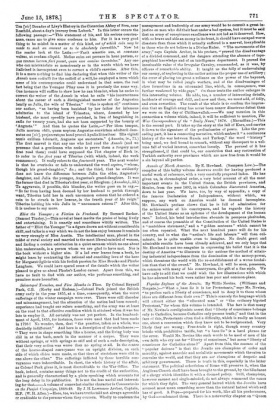Sebastopol Trenches, and Five Months in Them. By Colonel Reynell
Pack, C.B. (Kerby and Endean.)—Colonel Pack joined the British army early in the year 1855, at a time, consequently, when the worst sufferings of the winter campaign were over. There were still disorder and mismanagement, but the attention of the nation had been roused ; experience had taught our rulers something, and the army was at least on the road to that effective condition which it attained when it was too late to employ it. All certainly was not yet perfect. In the bombard- ment of April, 1855, for instance, fuses were used that had been made in 17981 No wonder, then, that " the practice, taken as a whole, was decidedly indifferent." And here is a description of the ambulances:— " They were in shape something like a hoarse, and the living body was slid in at the back, much in the manner of a corpse. They wore without springs, or with springs so stiff and of such a rude description, that their very action was worse than no spring at all. In the centre of the hearse-shaped conveyance was an upright division, on each aide of which slides were made, so that tiers of stretchers were slid in one above the other." The sufferings inflicted by these horrible con- veyances were indescribable. In short, the whole history of the affair, as Colonel Pack gives it, is most discreditable to the War Office. The book, indeed, contains many things not to the credit of the authorities, and is generally characterised by a plain-speaking which accounts for the long delay in its publication. It is not the less useful and interest- ing for that.—A volume of somewhat similar character is Commentaries on the Punjab Campaign, 1848-49. By J. H. Lawrence Archer, Captain, H.P. (W. H. Allen.) —Here, too, we have truths told not always agreeable or creditable to the persons whom they concern. Wholly to condemn the management and leadership of our army would be to commit a great in- justice on men who did their best under a bad system, but it must be said that an army of conspicuous excellence was not led as it deserved. How, with so brave and able an enemy in its front, it should have escaped worse disasters than those which it actually suffered is a marvel, inexplicable to those who do not believe in a Divine Ruler. " The movements of the army," says Captain Archer, in his preface, " proved the disadvantage of a divided command, and the dangers attending the absence of topo- graphical knowledge and of an intelligence department. It proved the inestimable value of the Irregular Cavalry, commanded, as it was, by officers of remarkable ability. It taught us the folly of undervaluing our enemy, of neglecting in the earlier actions the proper use of artillery ; the error of placing too groat a reliance on the power of the bayonet, in what may be called jungle warfare, and of the disadvantages of close formations in an attenuated line, which, in consequence, was further weakened by wide gaps." On these texts the author enlarges in this interesting volume. He adds, too, a number of interesting details, incidents of courage and skill, and now and then, we must add, of folly, and even cowardice. The result of the whole is to confirm the impres- sion that an English army has never been nearer disastrous defeat than we were on the day of Chillianwallah.—We may mention in this connection a volume which, indeed, it will be sufficient to mention, The War Correspondence of the "Daily News," 1878. (Macmillan.)—This is the second part. It takes up the story at the fall of Kars, and carries it down to the signature of the preliminaries of peace. Like the pre- ceding part, it has a connecting narrative, which makes it " a continuous history of the war between Russia and Turkey," the word " history " being used, we feel bound to remark, without any disrespect to a vol- ume full of varied interest, somewhat loosely. The perusal of it has strengthened, if that could be, our conviction that any restoration of Turkish authority over provinces which are now free from it would be a sin beyond all pardon.


































 Previous page
Previous page